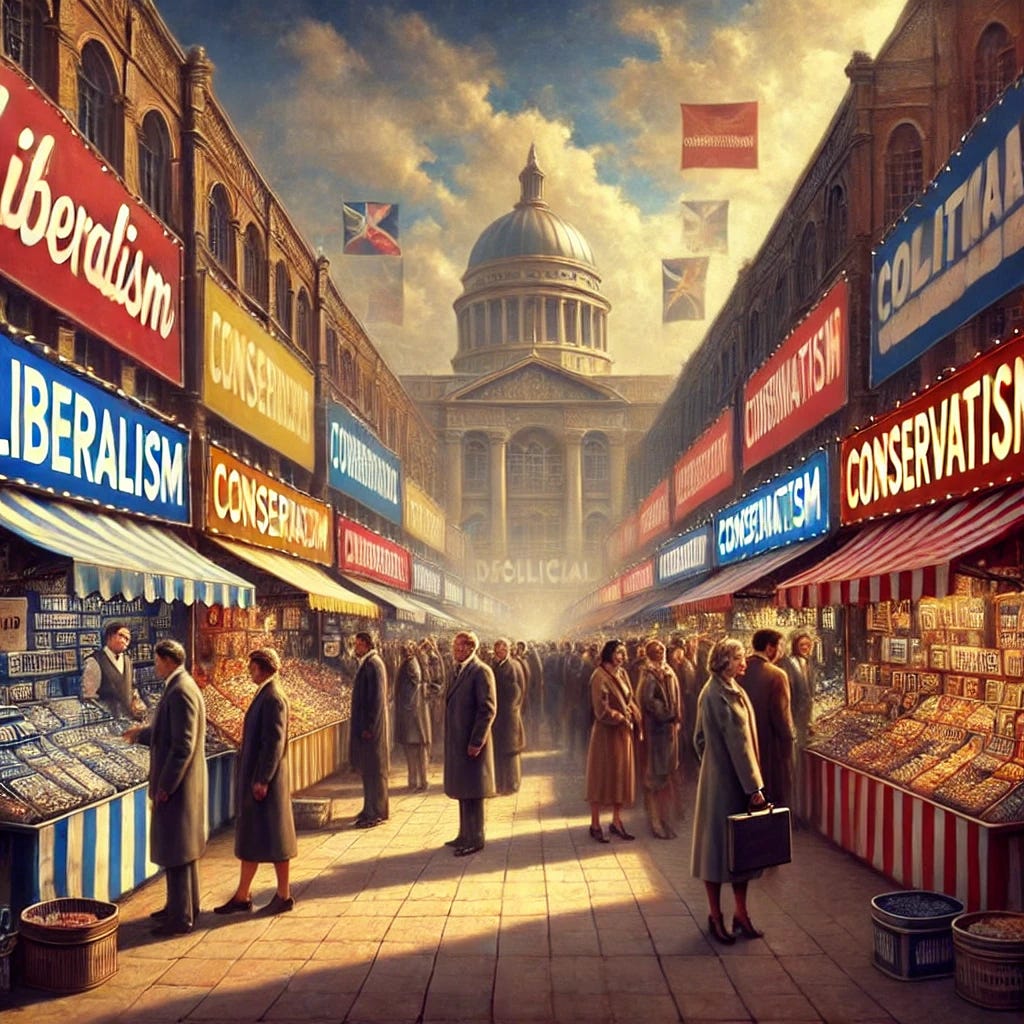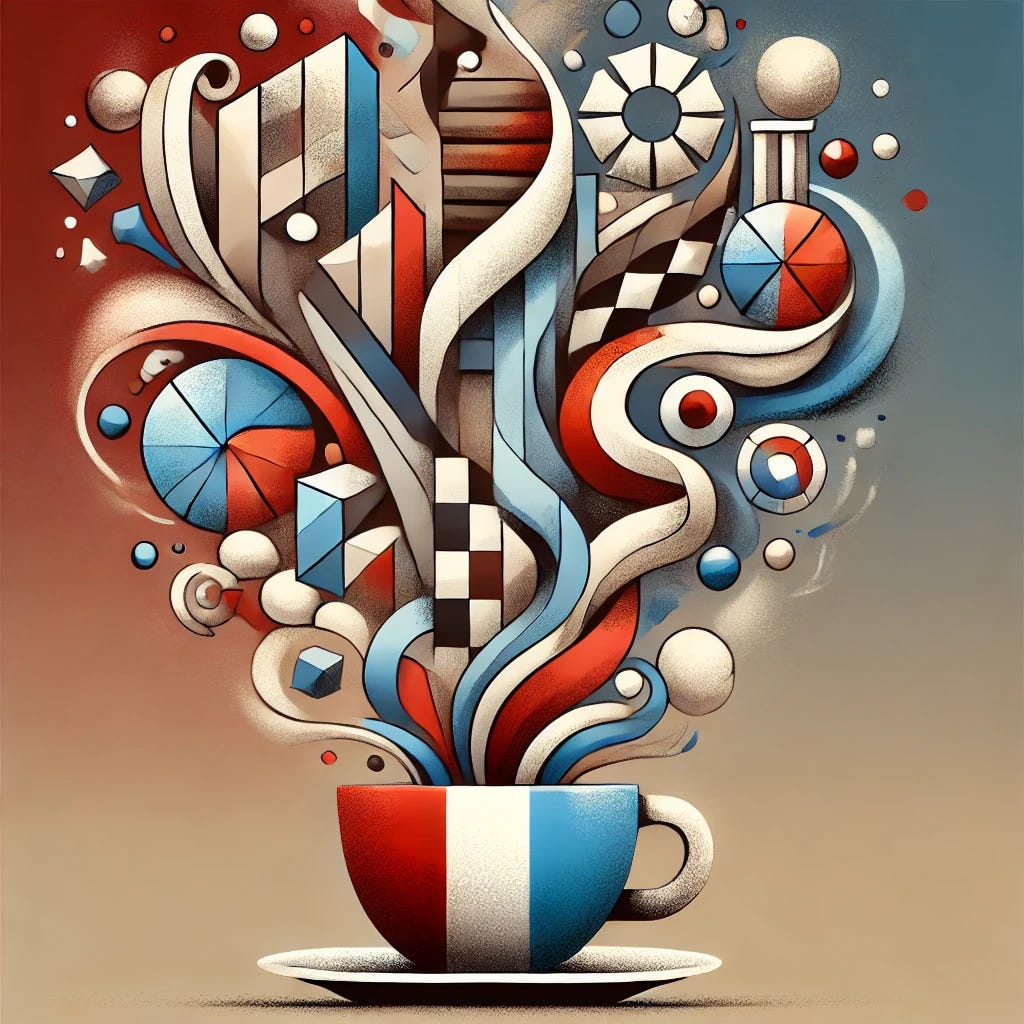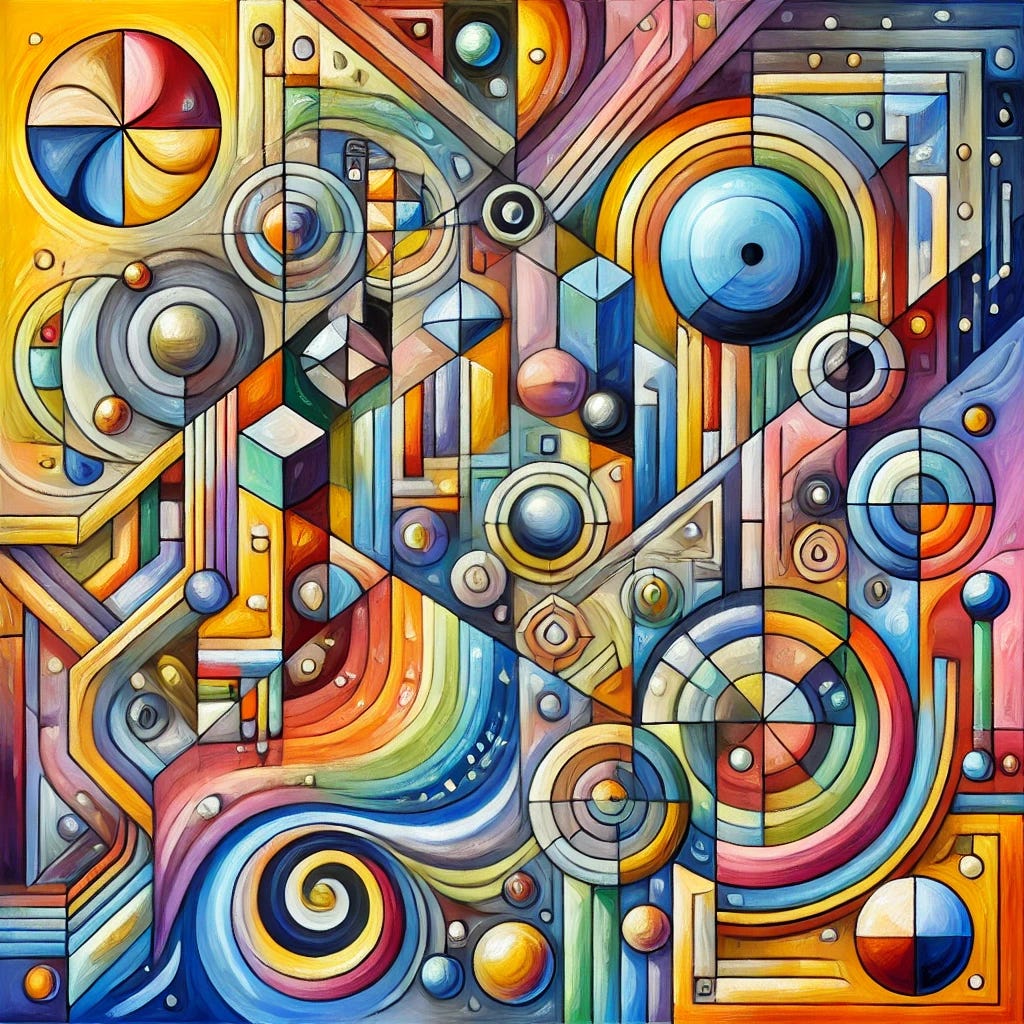Conservatism has a branding problem but in Canada is becoming cooler.
Progressivism is so much hipper and makes people feel better about themselves, including lots of dopamine rewards.
If you believe in the importance of free speech, subscribe to support uncensored, fearless writing—the more people who pay, the more time I can devote to this. Free speech matters. I am a university professor suspended because of a free speech issue, so I am not speaking from the bleachers. The button below takes you to that story.
______________________________________________________________________
We tell ourselves that we are creatures of reason and that our political leanings are based on some synch between moral values and political precepts. But life is seldom this simple, and research shows that many factors and desires create our political leanings; some work subconsciously, some come from how we were raised, from our experiences and observations and undoubtedly from our genetics.
Indeed, political positions are a multi-ingredient soup, and after stirring, sampling, and heating, it isn't easy to figure out the recipe.
But what about the moderates, the independents, the ones in the middle who hate seeing the cart stuck in front of the horse and believe that their ethical values drive them? They refuse to adopt a political tag that presupposes those values; they disdain party politics and conventional political orthodoxies. They, too, are still susceptible to the same biases and forces that affect those who call themselves liberal (progressive) or conservative (yet to come up with a brand as hip as progressive).
In his famous book The Righteous Mind, political psychologist Johnathon Haidt explains that modern liberalism (like any ideology) can foster a sense of moral elevation among its adherents, partly because it appeals to values like care, justice, and social responsibility. He explains that people are drawn to moral communities that reinforce their values and, as a result, may develop a sense of superiority. The packaging of liberalism—emphasising empathy, social equity, and systemic responsibility—can contribute to this effect.
“Morality binds and blinds. It binds us into ideological teams that fight each other as though the world's fate depended on our side winning each battle.”
— Jonathan Haidt.
It's more complicated why people align themselves with conservatism. Conservatism has a branding problem. History books are not loaded with stories of people who famously didn’t do something or suggested stopping doing something when surrounded by those who were enthused to move forward.
Look at the term “conservative.” At its core, “conservative” means to preserve, hold, and resist quick changes that could endanger what is good or stable. Its etymology and connotations suggest caution, even resistance to change—an old-fashioned position in our digital world characterised by rapid cultural shifts.
The question of who the conservatives are now with a Trump victory is better left to another day.
In a world drawn to novelty and “reinvention,” conservatism’s very identity is tied to resisting trends for the sake of stability, for the preservation of what has been proven, and for faith in inherited wisdom. Not particularly cool.
Some argue that conservatism grounds itself in more universally relatable principles like family, tradition, and individual freedom. This emphasises humility before tradition and caution regarding rapid social change.
“Conservatism understands that human beings are flawed creatures… and precisely this understanding drives the more humble approach to policy.”
— Yuval Levi.
Of course, this is a tough sell to a public enraptured by promises of continuous improvement. Conservative politics offer the metaphorical anchor, the ballast that stabilises society—but an anchor is hardly “sexy,” nor does it align with the appealingly and ambitious promise of “progress.”
How many famous movie scenes have the captain dropping anchor and sitting on the deck? No, it’s batten down the hatches, lift your chin, put your nose into the wind and surge bravely forward, riding out the storm.
According to studies on social identity and political branding, aligning with liberalism can function as a kind of social signalling—indicating that one is on the “enlightened” or “right” side of history. Liberals often see their identity as synonymous with empathy, tolerance, and sophistication, elevating their perceived social standing.
This phenomenon has been explored in branding studies, where liberalism has been compared to an aspirational brand that one buys into as a statement about oneself.
Research by psychologists like David Dunning (of the Dunning-Kruger effect) suggests that people can derive a psychological reward from perceiving themselves as morally or intellectually superior. The self-perception of understanding complex social or economic problems better than others can be a strong psychological motivator.
“People are not only frequently overconfident but have no insight into their errors, thus cementing a superiority complex.”
— David Dunning.
Political psychologist Jaime Napier has found that liberal individuals often perceive their beliefs as “high-status” views, adding an implicit layer of self-worth to their identification. In a culture where the “woke” and the “progressive” are often valorised, Liberalism holds an appeal similar to that of a luxury brand, carrying the perception of prestige and virtue.
Furthermore, Liberals even do a better job naming themselves. They are progressive and all about moving forward into the glory and brightness of human accomplishment. They are open, liberated and have a plan. It is a compelling vision.
This fundamental advantage in branding cannot be overstated.
By framing itself as “Progressive,” liberalism aligns with human nature’s yearning for improvement and aspiration.
This claim of inevitability gives liberalism an allure of unstoppable forward momentum as if aligning with it connects one with a moving history. To be progressive is to imagine oneself as a character in a grand social narrative, pushing the boundaries of freedom, knowledge, and justice to a greater vision for humanity. As long as progress, as a concept, remains positive and desirable, liberalism retains a rhetorical monopoly on the moral high ground.
For all its virtues of pragmatism and caution, conservatism struggles to embody an equally inspiring ideal. Its purpose is not to “progress” but to secure—to look back at what has endured and recognise its value.
Historian Victor Davis Hanson has argued that modern liberalism, especially in elite circles, sometimes fosters what he calls “moral narcissism.” He describes this as the tendency to adopt fashionable moral causes, not necessarily for practical results but to feel morally superior.
“Much of today’s ideology… is predicated on the idea that by expressing the right concern about the right issues… one becomes morally superior.”
— Victor Davis Hanson.
William F. Buckley, Jr. famously quipped that a conservative “stands athwart history, yelling Stop.” And while “standing athwart history” may be necessary at times, it is rarely romantic.
Conservatism asks us to consider the risks of rapid change, the virtues of stability, and the profound wisdom embedded in cultural inheritance. But in an age that prizes speed and novelty, it’s no surprise that the promise of “progress” holds a more compelling sway over hearts and minds.
Indeed, progressive politics are inherently more “sexy” because they promise transformation. Liberalism promises its followers that they’re not merely preserving a status quo but helping to build a better world. This is not just a matter of policy; it’s a matter of identity.
To be progressive is to cast oneself as a visionary, morally ahead of the curve, and the one with the courage to disrupt. In contrast, the conservative is cast as stodgy, resistant, perhaps out of touch—a custodian of the past rather than an architect of the future.
Ultimately, this linguistic advantage allows liberalism to offer policies and an empowering vision of one’s role in the world. It taps into the desire to be seen as “cooler,” smarter, and on the “right side of history.” Liberalism thus combines its substantive goals with a style and rhetoric that makes its adherents feel modern, noble, and progressive in every sense of the word.
Though conservatism may counter with sound arguments for patience, prudence, and the wisdom of the ages, it lacks the inherently flattering allure of its competitor. This tension between progress's romantic appeals and conservatism's unsexy, stoic prudence underpins modern politics's enduring, often one-sided tug-of-war.
This aligns closely with what economist and philosopher Thomas Sowell has critiqued about the nature of modern liberalism.
As he wrote, “One of the painful signs of years of dumbed-down education is how many people cannot make a coherent argument. They can vent their emotions, question other people’s motives, make bold assertions, repeat slogans—anything except reason.” Sowell’s critique points to a cognitive bias inherent in the liberal brand, where alignment with progressive ideologies can sometimes replace the need for critical thinking.
Rather than a framework for analysis and discourse, liberalism becomes a symbol of status and moral superiority, bypassing the need for careful reflection in favour of belonging to an elite intellectual club.
Moreover, social psychologists have observed that people who identify as liberal often experience a “warm glow” effect—a psychological reward similar to the feeling of charitable giving or volunteerism. This built-in intrinsic benefit is at the heart of modern (not classic, that’s more like conservatism) liberalism; it comes with extra dopamine.
The label “liberal” allows individuals to view themselves as compassionate and engaged in improving society. This effect is especially strong when it aligns with their social group’s values, creating a feedback loop that reinforces their sense of moral and intellectual superiority.
In contrast, conservatism does not offer the same immediate boost to one’s brand. Where liberalism provides a sense of belonging to a larger social justice narrative, conservatism encourages caution, restraint, and scepticism of sweeping reforms—traits that are not as easily packaged as moral or intellectual status symbols.
By its very nature, conservatism prioritises humility and respect for traditional wisdom over social signalling. Yet, in the modern cultural marketplace, where newness is idolised, these values struggle to compete with the allure of progress and status that liberalism deftly markets.
Ultimately, liberalism’s brand advantage rests on its policies and the powerful psychological rewards it offers. It allows people to view themselves as agents of change, morally astute and intellectually elevated.
Conservatism’s virtues may be profound, but without the same capacity for self-glorification, it lacks liberalism’s “cool factor.” As a result, liberalism's identity-driven power often wins the cultural battle, offering not just a political philosophy but a flattering lens through which adherents view themselves and their place in the world.
But which one works better? That’s another question, and it's not getting much attention. Waiting to see or examine history to evaluate past political concepts is hard work. So many ‘modern’ ideas are rehashed, and old ones have failed, bu
t we are duped.
The modern tune is often the same, and the melody hasn’t changed; the harmony has just been tweaked.
But humanity presses forward, and progressiveness usually wins the branding wars. However, quiet voices sometimes warn that newer isn’t always better and that we would do well to examine ourselves and find the roots of our political leanings.







